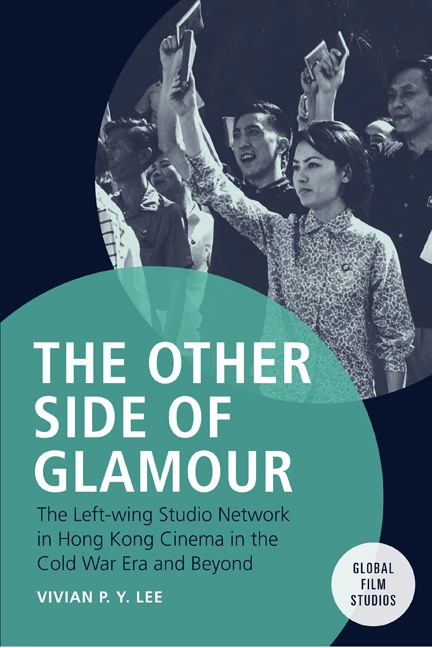 The Other Side of Glamour
The Other Side of Glamour Book contents
- Frontmatter
- Cotents
- List of Figures
- Acknowledgments
- A Note on the Timeline
- Timeline
- Dedication
- 1 Introduction
- 1 The Left-Wing Film Apparatus in Postwar Hong Kong
- 2 Left in the Right Way: Corporate Strategy and the Making of a Popular left-wing
- 3 Remaking Cantonese Film Culture: Union and Sun Luen
- 4 Class, Gender, and Modern Womanhood: Feng Huang and Great Wall
- 5 Corporate Repositioning, Transnational Cultural Brokerage, and Soft Power: Sil-Metropole
- 6 Critical Transitions on the Non-Left: Patrick Lung and Cecile Tang
- 7 From Political Alibis to Creative Incubators: the Left-Wing Film network since the 1980s
- Epilogue
- Bibliography
- Filmography
- Index
1 - Introduction
Published online by Cambridge University Press: 17 September 2020
- Frontmatter
- Cotents
- List of Figures
- Acknowledgments
- A Note on the Timeline
- Timeline
- Dedication
- 1 Introduction
- 1 The Left-Wing Film Apparatus in Postwar Hong Kong
- 2 Left in the Right Way: Corporate Strategy and the Making of a Popular left-wing
- 3 Remaking Cantonese Film Culture: Union and Sun Luen
- 4 Class, Gender, and Modern Womanhood: Feng Huang and Great Wall
- 5 Corporate Repositioning, Transnational Cultural Brokerage, and Soft Power: Sil-Metropole
- 6 Critical Transitions on the Non-Left: Patrick Lung and Cecile Tang
- 7 From Political Alibis to Creative Incubators: the Left-Wing Film network since the 1980s
- Epilogue
- Bibliography
- Filmography
- Index
Summary
As a contribution to the Global Studios series, this book is the first book-length study in English dedicated to Hong Kong's left-wing film studios as a network of individual and corporate agents serving a common ideological course under the auspice of the Communist Party (CCP). Critical discourse on the Hong Kong left-wing cinema has emphasized the progressive filmmakers as primarily an ethical force caught in a left–right divide and an advocate of social and cultural reform through the cinematic medium. While this ethical-reformist bent of the cinematic left is central to the aesthetic vision and public image of the progressive film community, the analysis presented in this study pays attention to the institutional and corporate character of the left-wing film apparatus and their strategic self-positioning in the mainstream film industry during the 1950s and 1960s. This understanding of the left-wing's praxis will have a bearing on production and exhibition strategies of film studios, as well as the continuation of the left-wing film network in the post-Cold War, post-Cultural Revolution era. Considering the change in industrial status and sociopolitical prominence of the reconstituted left-wing film network since Hong Kong's return to Chinese rule in 1997, the temporal stretch to the post-handover period is deemed necessary for an overall evaluation of the historical trajectory of the left-wing film establishment in Hong Kong, in particular in relation to China's cultural policy toward Hong Kong since the mid-twentieth century. In addition to elucidating the historical trajectories and representative figures and films of the major studios, the inquiry into the cinematic left in Hong Kong in this study is informed by the following questions:
How did the left-wing studios and filmmakers position themselves and their productions in colonial Hong Kong vis-a-vis their rightwing counterparts and other commercial studios at the time?
Apart from studio labels, what qualities would identify a film as “left-wing” that would differentiate it from non-left-wing (or “right-wing”) films?
Is there a consistent intellectual-political orientation in left-wing studio productions? If so, how did the studio management and production crew negotiate perceived conflicts between art, ideology, and entertainment?
- Type
- Chapter
- Information
- The Other Side of GlamourThe Left-wing Studio Network in Hong Kong Cinema in the Cold War Era and Beyond, pp. 1 - 19Publisher: Edinburgh University PressPrint publication year: 2020


